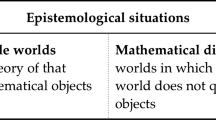Abstract
The traditional formulation of the indispensability argument for the existence of mathematical entities (IA) has been criticised due to its reliance on confirmational holism. Recently a formulation of IA that works without appeal to confirmational holism has been defended. This recent formulation is meant to be superior to the traditional formulation in virtue of it not being subject to the kind of criticism that pertains to confirmational holism. I shall argue that a proponent of the version of IA that works without appeal to confirmational holism will struggle to answer a challenge readily answered by proponents of a version of IA that does appeal to confirmational holism. This challenge is to explain why mathematics applied in falsified scientific theories is not considered to be falsified along with the rest of the theory. In cases where mathematics seemingly ought to be falsified it is saved from falsification, by a so called ‘Euclidean rescue’. I consider a range of possible answers to this challenge and conclude that each answer fails.
Similar content being viewed by others
References
Azzouni J. (2004) Deflating existential consequence: A case for nominalism. Oxford University Press, New York
Baker A. (2001) Mathematics, indispensability and scientific progress. Erkenntnis 55: 85–116
Baker A. (2005) Are there genuine mathematical explanations of physical phenomena? Mind 114: 223–238
Baker A. (2009) Mathematical explanation in science. British Journal for the Philosophy of Science 60(3): 611–633
Boyd, R. (1984) The current state of the realism debate. In J. Leplin, Scientific realism. Berkeley: University of California Press.
Busch, J. (forthcoming). Is the indispensability argument dispensable? Theoria: A Swedish Journal of Philosophy.
Colyvan M. (2001) The indispensability of mathematics. Oxford University Press, New York
Colyvan M. (2006) Scientific realism and mathematical nominalism: A marriage made in hell. In: Cheyne C., Worrall J. (eds) Rationality and reality: Conversations with Alan Musgrave. Australasian Studies Series, Kluwer, pp 225–237
Colyvan M., Lyon A. (2008) The explanatory power of phase spaces. Philosophia Mathematica 16(2): 227–243
Dieveney P. S. (2007) Dispensability in the Indispensability Argument. Synthese 157: 105–128
Field H.H. (1980) Science Without Numbers: A Defence of Nominalism. Blackwell, Oxford
Hacking I. (1982) Experimentation and Scientific Realism. Philosophical Topics 13: 71–87
Liggins D. (2008) Quine, putnam and the ‘quine-putnam’ indispensability argument. Erkenntnis 68: 113–127
Maddy P. (1992) Indispensability and practice. Journal of Philosophy 89: 275–289
Maddy P. (1997) Naturalism in mathematics. Clarendon Press, Oxford
Maddy P. (2007) Second philosophy: A naturalistic method. Oxford University Press, Oxford
Morrison J. (2010) Just how controversial is evidential holism? Synthese 173(3): 335–352
Parsons C. (1983) Mathematics and philosophy. Cornell University Press, Ithaca
Peressini A. (2008) Confirmational holism and its mathematical (w)holes. Studies in History and Philosophy of Science 39: 102–111
Pincock C. (2004) A revealing flaw in Colyvan’s indispensability argument. Philosophy of Science 7(1): 61–79
Psillos S. (1999) Scientific realism: How science tracks the truth. Routledge, London
Putnam, H. (1979a). Philosophy of logic. In Philosophical papers I: Mathematics matter and method (2nd Edn., pp. 323–357). Cambridge: Cambridge University Press (first published 1971).
Putnam, H. (1979b). What is mathematical truth. In Philosophical papers I: Mathematics matter and method (2nd Edn., pp.60–78). Cambridge: Cambridge University Press.
Quine, W. V. (1953a). On what there is. In From a logical point of view (2nd Edn). Cambridge, MA: Harvard University Press.
Quine, W. V. (1953b). Two dogmas of empiricism. In From a logical point of view. Cambridge, MA: Harvard University Press.
Quine, W. V. (1981). Carnap and logical truth. In The ways of paradox. Cambridge, MA: Harvard University Press.
Quine, W. V. (1986). Reply to Charles Parsons. In L. E. Hahn P. A. Schilpp (Eds.), The philosophy of W. V. Quine. Open Court: La Salle Ill, (pp. 396–403).
Quine, W. V. (1992). Pursuit of truth (2nd Edn.), Cambridge, MA: Harvard University Press (first published 1975).
Resnik M. (1997) Mathematics as a science of patterns. Clarendon Press, Oxford
Sober E. (1993) Mathematics and indispensability. Philosophical Review 102: 35–58
Sober E. (2000) Quine. The aristotelian society supplementary 74(1): 237–280
Van Fraassen B. (1980) The scientific image. Clarendon Press, Oxford
Author information
Authors and Affiliations
Corresponding author
Rights and permissions
About this article
Cite this article
Busch, J. Can the new indispensability argument be saved from Euclidean rescues?. Synthese 187, 489–508 (2012). https://doi.org/10.1007/s11229-010-9848-6
Received:
Accepted:
Published:
Issue Date:
DOI: https://doi.org/10.1007/s11229-010-9848-6



